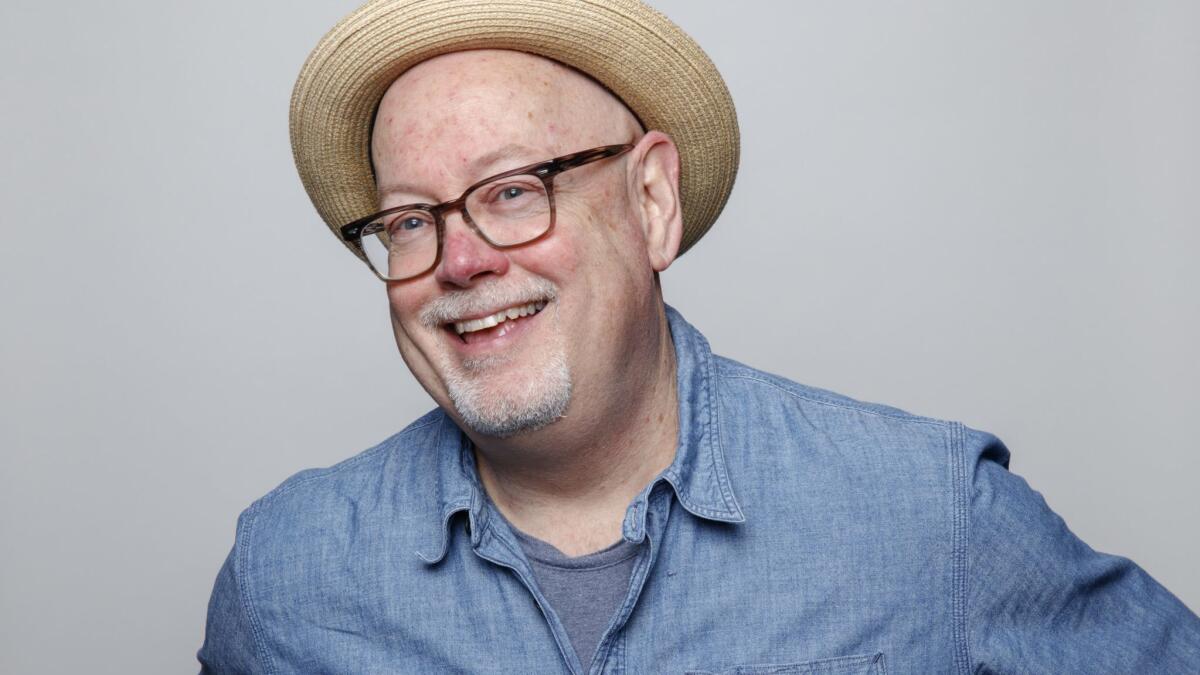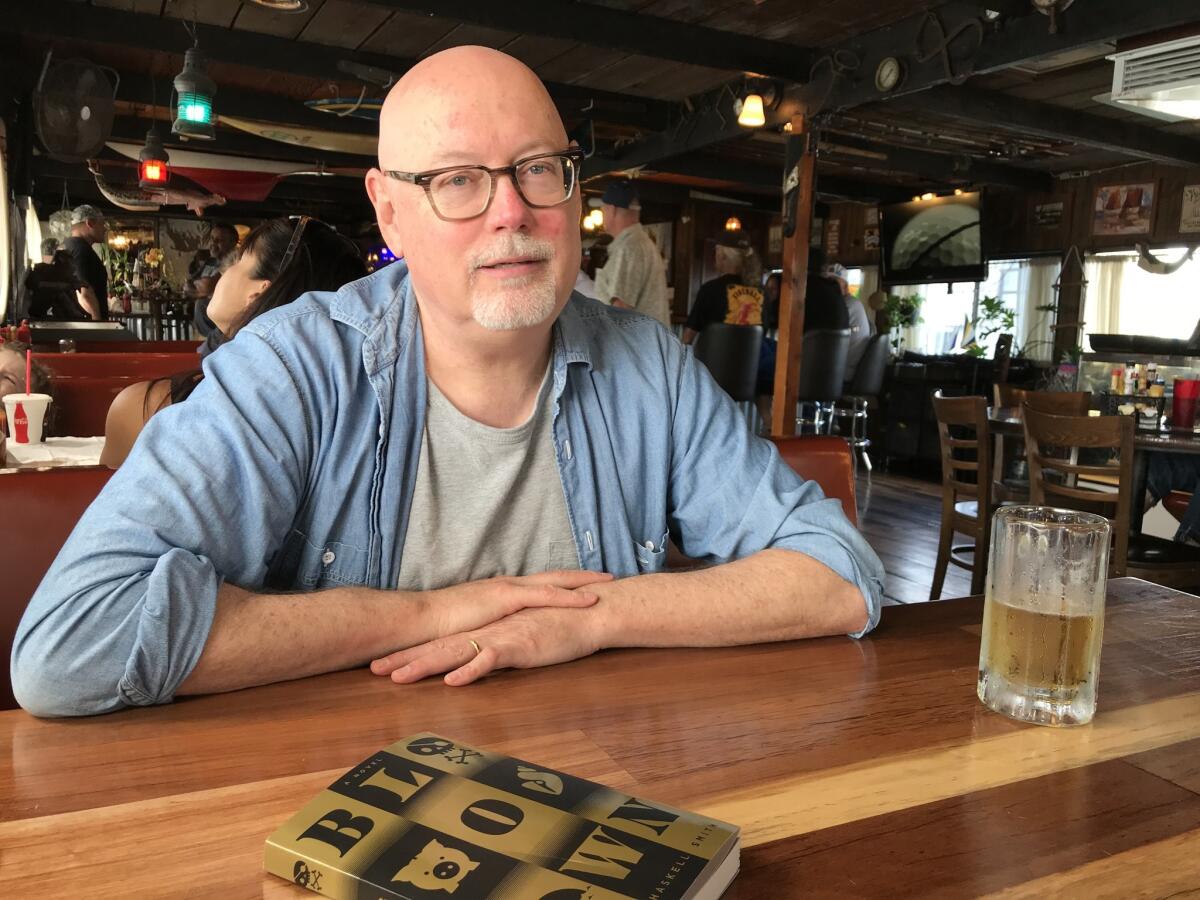Adrift in Los Angeles: Mark Haskell Smith and his book, ‘Blown’

- Share via
“Blown,” the new, funny and sometimes raunchy novel from L.A. writer Mark Haskell Smith, begins on a ship adrift with one dying passenger and $12 million in cash. To talk about it, I asked Smith — who is a friend and game for just about anything — to join me at the only floating restaurant in the port of Los Angeles.
According to legend, the Chowder Barge started out as a hauler for the 1935 film “Mutiny on the Bounty,” was later a houseboat and allegedly a brothel. Since 1969, it has been a restaurant and bar serving locals who sail or live on the boats moored nearby. It was moved to its current location in Wilmington in the late 1980s and lists a little. Its very existence as a functioning eatery seems to come from the unexpected results of unusual choices, which is very much like the plot of “Blown” (out now from Grove).
It all starts when a disaffected Wall Street trader decides to get even with his industry by stealing $15 million. He’s good at moving money, so he gets it to the Cayman Islands. His company finds out and dispatches a fixer and his boss — a buttoned-up woman — to retrieve the funds. The cast of characters includes a pint-size private detective with a way with women, a local artist sick of painting turtles for tourists and an Australian woman sailing solo around the globe. No matter how good their intentions, everyone who comes close to those millions gets slightly warped.
The book is a delightful read — think Elmore Leonard meets Carl Hiaasen — with an undercurrent of greed and consequences. Here’s what Smith had to say about it.
On his inspiration
When I sailed through the Greek islands on a five-masted sailing ship, I paid a lot of attention to what was happening on the boat. One of the perks of writing a book on the history of nudism [“Naked at Lunch”] is I got invited to go on a nudist tour. I was two weeks on a boat cruising the Greek islands; I gave lectures on the history of nudism and a writing workshop. I was on another nude cruise and they stopped in the Cayman Islands and saw these small, three-story buildings with 300 banks having their address there. That’s where they’re registered so they don’t pay taxes. And I thought, “Oh, this is great.” Before that, five years ago, I wrote the guy adrift in the very first scene. Then I had to figure out what he was doing, why he was there and how he got there. Which is kind of the great fun of writing, right?
On his favorite character in the book
Piet, the private investigator from Curacao, is my favorite character. Because he’s a badass, and a little person. He’s just doing his job. He has nothing invested until he kind of falls in love, and then things change for him. I researched a lot, went to achondroplasia websites. In the text, there are clues: He has to reach up to the bar to get a napkin. Then, finally, at the end of the chapter where I introduce him, I write that if he was six feet tall, he’d be average proportioned. But because he’s 4 foot 7, his genitals look quite large. And he uses that to his advantage. Which means that somewhere in my search history, there’s something about “little person genital size” that someone will find someday.
Sex in fiction
If you think about all the decisions you make in your life, a lot of times, you’ll move to another city or across the country to be with another person. That’s to have sex. It’s a big motivator in our lives, particularly when we’re younger. I use it a lot as a transformative thing. My character Seo-yun is this buttoned-up Wall Street genius, and she finally discovers the sensuality of life. She gets in a warm tropical rain. She starts having sex. In a way, it’s an act of rebellion, because she has a very oppressive fiancé. He cares — too much. From his side, he loves her and he wants to have the perfect marriage — from her side, it’s suffocating.
Embezzling $15 million
The whole embezzlement thing I had figured out based on a hunch. So much of Wall Street is about trust. We trust these people, and there’s no reason they can’t just trouser our money. I ran it by a friend of mine who’s an investment banker, and he gave me a couple of tweaks, and then said, “Now, I have to erase my browser history, because if anything happens and they look at this, they’ll think I stole a bunch of money.” So it is a how-to also.
On money and happiness
One of the bigger themes I wanted to explore was that people think money buys happiness. Look at Kate Spade and Anthony Bourdain: Money doesn’t necessarily buy happiness. I wanted to see, if you were put in a position where all you had to do was make one bad decision and you could be rich for the rest of your life and do whatever you wanted, what would that be like? Does it turn out well? Or is making that decision haunting you?
There’s a thing that happens in a lot of crime novels where people kill other people and it’s no big deal. Ah, he was murdered. But if you really start to unpack it, there’s an absence of that person in the world. All the people that they were connected to in that world are now missing the person.
After someone is gone
Both my parents died while I was writing the book. You go through all this stuff and it’s a house that they lived in, maybe you lived in it too, and then it’s all painted and someone else lives there. And every trace of them, really, except for a few little things, is just gone. My stepfather, he had no family left. He was an only child and he never had kids, and so when you get his high school diploma, his pictures, his stuff, no one wants it. So you just throw it away. Put it in a dumpster. Not that I have a lot of sympathy for him — he wasn’t a particularly good guy — you feel a sense of, What is a life? That’s that dude’s life right there. Off to the landfill. The absence of a life, when it’s taken away, there’s a vibration there, for want of a better word.
Fiction versus film
The great thing you can explore in fiction that you can’t in, let’s say, movies: You can go internal with people. Every time they make a decision — and they all, every character, just make a boatload of bad decisions, no pun intended — you get to internalize the consequences. They realize what they’re doing, or maybe don’t realize what they’re doing. I think being able to do that with prose is just a richer emotional experience for the reader and for the writer too.

Writing a book that’s a speedy read
It’s not easy to make a really fun book that actually says something about people’s emotions in the world. To do that and make it so that someone devours it, that’s what I’m going for. That’s all I want. To use a food metaphor: If you make the world’s most delicious gelato out of all these hand-raised ingredients and you milk the cows yourself — you want people to devour it because it’s so delicious they can’t stop eating it. That’s kind of where I’m coming from.
More to Read
Sign up for our Book Club newsletter
Get the latest news, events and more from the Los Angeles Times Book Club, and help us get L.A. reading and talking.
You may occasionally receive promotional content from the Los Angeles Times.









